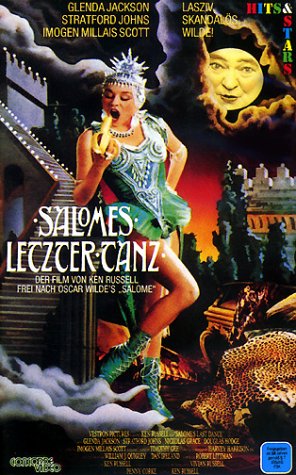
Salome's Last Dance Page #2
- R
- Year:
- 1988
- 89 min
- 290 Views
Like a woman rising from a grave,
she looks like a dead woman
seeking out the dead.
She looks strange!
She looks like a princess
in a yellow veil with silver feet!
has feet like little white doves.
She could be dance!
She is like a dead woman!
She moves very slowly.
What a din!
Who are those wild howling beasts?
The Jews. They're always like that.
They are discussing their religion!
Why are they discussing their religion?
- I don't know, they're always at it!
The Pharisees say there are angels,
the Saducees say they don't exist!
I think it's ridiculous to argue
about such things.
How beautiful the Princess
Salome looks tonight!
You look at her too often.
You mustn't look at people like that..
Something terrible could happen!
She is very beautiful tonight.
Tetrarch looks glum.
Yes, he is looking glum!
He's looking at something.
- He's looking at someone!
Who's he looking at?
I don't know!
How pale the princess is!
Never have I seen her so pale!
She looks like the reflection
of a white rose in a silver mirror!
You mustn't look at her!
You look at her too much!
Herodias has poured
the Tetrarch a drink.
Is Herodias the one with the red eyes,
the ruby lips, the ruby hips
and the red rubies!
Yes, that's Herodias!
She's the wife of the Tetrarch.
the island of Samothrace..
is as purple as Caesar's cloak.
Ah, Caesar! I've never had the pleasure!
Another from the city of Chipra
is as yellow as gold!
Gold!
I love gold!
And a third, which is a Sicilian wine,
that one is as red as blood!
The gods of my country love blood.
Twice a year, we sacrifice youths
and virgins to 'em..
50 youths and a 100 virgins.
But it seems we never give 'em enough!
because they still persecute us.
In my country, there aren't any gods
now! The Romans chased them out!
There are those who say they hid in the
mountains, but I don't believe it!
I spent three nights in the hills,
looking everywhere..
but I didn't find them!
Finally, I called upon each one by name!
But they didn't appear.
I think..
they are dead!
The Jews worship a god they can't see!
Really? - In fact, they only
worship things they can't see.
Ridiculous!
After me, will come one
even more mighty!
Sometimes, he says fearful things
but we never understand him!
Can we see him?
Nooooooo! The Tetrarch forbids it!
What a bizarre prison!
It's an old well.
An old well? It must be very unhealthy.
Take the brother of the
Tetrarch, his elder brother,
Queen Herodias' first husband.
He was incarcerated down there
for 12 years and he didn't die!
Translation
Translate and read this script in other languages:
Select another language:
- - Select -
- 简体中文 (Chinese - Simplified)
- 繁體中文 (Chinese - Traditional)
- Español (Spanish)
- Esperanto (Esperanto)
- 日本語 (Japanese)
- Português (Portuguese)
- Deutsch (German)
- العربية (Arabic)
- Français (French)
- Русский (Russian)
- ಕನ್ನಡ (Kannada)
- 한국어 (Korean)
- עברית (Hebrew)
- Gaeilge (Irish)
- Українська (Ukrainian)
- اردو (Urdu)
- Magyar (Hungarian)
- मानक हिन्दी (Hindi)
- Indonesia (Indonesian)
- Italiano (Italian)
- தமிழ் (Tamil)
- Türkçe (Turkish)
- తెలుగు (Telugu)
- ภาษาไทย (Thai)
- Tiếng Việt (Vietnamese)
- Čeština (Czech)
- Polski (Polish)
- Bahasa Indonesia (Indonesian)
- Românește (Romanian)
- Nederlands (Dutch)
- Ελληνικά (Greek)
- Latinum (Latin)
- Svenska (Swedish)
- Dansk (Danish)
- Suomi (Finnish)
- فارسی (Persian)
- ייִדיש (Yiddish)
- հայերեն (Armenian)
- Norsk (Norwegian)
- English (English)
Citation
Use the citation below to add this screenplay to your bibliography:
Style:MLAChicagoAPA
"Salome's Last Dance" Scripts.com. STANDS4 LLC, 2024. Web. 26 Apr. 2024. <https://www.scripts.com/script/salome's_last_dance_17377>.


Discuss this script with the community:
Report Comment
We're doing our best to make sure our content is useful, accurate and safe.
If by any chance you spot an inappropriate comment while navigating through our website please use this form to let us know, and we'll take care of it shortly.
Attachment
You need to be logged in to favorite.
Log In